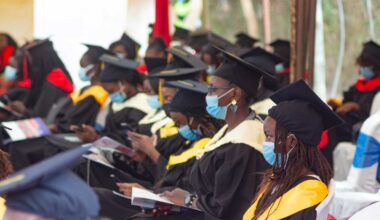For some good reasons, the Ministry of Education had banned ranking of schools to eliminate the culture of rivalry in education but it has slowly sneaked back. While competition is good in some aspects such as sports, it doesn’t achieve anything in academia rather than ego lifting and chest thumping to the top performers and shaming to the low performers. Whereas good results need to be appreciated and celebrated to encourage hard work, the way it is done only demoralizes, demeans, and undermines the little-resourced schools, especially when it is clear that the learning environment in Kenya is highly disproportionate and unbalanced. Besides, it is likely to perpetuate the culture of competition and ego-manning in the long-run in the workplace and general life realm.
The danger of inculcating the culture of competition to the form four leavers, especially those who were in well-resourced schools, is that, they are likely not to enjoy the same favorable environment in the outside realm. While coming out of schools with high expectations is understandable, maneuvering through the outer world to achieve their ambitions is laborious.
Besides ranking, the culture of competition in education is accentuated by wild celebrations exhibited across the country. A well-resourced school coalescing its students and teachers on the streets to wildly and provocatively celebrate examination results is almost tantamount to a social misdemeanor. These are schools that have the best teaching and learning conditions with all the facilities ranging from laboratories, equipment, and learning resources. Most of their teachers have also authored revision guides and materials as well as set examinations. They also enjoy the best teachers and leaders, sometimes whom they pluck from the lesser fortunate schools by arm-twisting the TSC. While they snatch well-polished, disciplined and hardworking teachers from the less-resourced schools, they weed out incompetent, rogue and unrefined teachers who are then transferred to these smaller schools. While it is good to celebrate and express joy over good performance, doing it in a mocking and demeaning manner only undermines and demoralizes other schools. Besides, it also isolates some students from those schools who did not attain the pass grade. The celebrations paint a vivid picture of a hero and a villain in a literary world. In this case, the heroes/heroines (those who have passed exams) are celebrated for being brave, smart and intelligent with a bright future, while the villain (those with ‘undesirable results) are isolated and dejected.
Competition and wild celebrations beat logic in academics, especially when schools should be at the forefront in appreciating the fact that learners are differently gifted. In the long-run, competition exacerbates the culture of isolation, demeaning and discrimination instead of accommodation, appreciation and teamwork in different realms of life. With the culture of competition deeply ingrained in their mindsets, high schoolers will proceed to higher learning institutions and into the workplace with the same gusto and mentality. In the long-run, such a culture convolutes one’s mentality to gauge and peg their progress and performance on the competition scale, mostly resulting in frustration when one doesn’t achieve their aspirations.
The Columnist is a Research Consultant, Policy Analyst & Strategist

